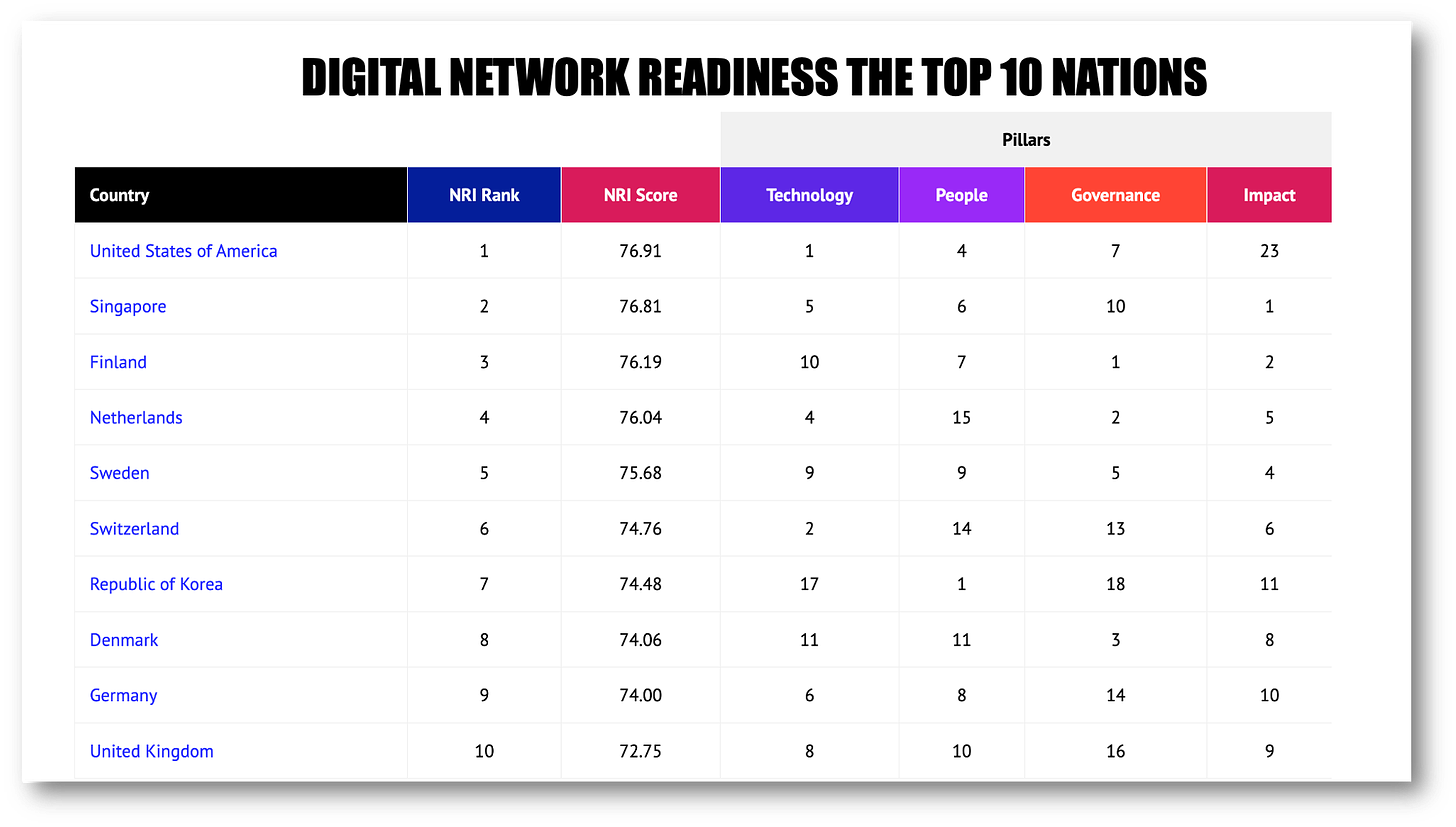Erosion of trust is a crisis of the digital age.
Network Readiness Index shows which nations are winning the digital race.
The United States retains its top position in the Network Readiness Index (NRI) for the second consecutive year, closely followed by Singapore. Singapore and Korea remain the only top 10 countries located in Asia and the Pacific, while the United States is the only economy located in the Americas. The rest of the top 10 rankings consist of European countries. Go EU!
Note: A high NRI score does not directly imply trust in digital.
There is no fintech, GenAI, embedded finance, CBDC or any other of the buzzwords in our digital world without trust. Trust is the glue of our new digital world, and its continued erosion is a serious problem.
👉TAKEAWAYS
Trust is the glue for our interconnected world
Over the past few decades, trust has progressively eroded. Mis-trust, once directed mostly at content like fake news, propaganda, and advertising claims, has morphed into systemic mistrust.
There are reasons for collective skepticism.
The decline in trust can be attributed to a range of factors, including the explosion of social media, advancements in generative AI, the rise of cryptocurrencies and blockchain technology, the spread of fake news, and privacy breaches.
We need to move past a perspective centered on harms.
While the digital realm is not without its challenges, it is essential to ensure our perspective isn't solely centered on potential dangers.
Access, Exposure and Skills Development are crucial to building trust.
Trust in digital technologies is built largely through personal experience. The more individuals interact with these platforms, the better they understand and appreciate their value.
We need to demystify technology.
Demystifying technology is critical to fostering trust in the digital age.
Appropriate data governance is required.
As technology continues to evolve, it is vital for society to identify the right balance between digitalization and fundamental human rights and aspirations.
Trust and Inclusion are interconnected.
Trust and inclusion are interconnected elements of technology readiness. When digital inclusion is promoted, it ensures that technology is accessible and used in ways that foster a learned level of trust.
“The data produce a strong positive link between income and digital success, a closer look at the group leaders in each income bracket reveals standout countries within their peer group.”
👊STRAIGHT TALK👊
The Network Readiness Index (NRI) provides a framework for assessing the impact of digital tech on society. Its score for digital readiness is based on technology, people, governance, and impact.
Of the four, governance has the biggest impact on trust, as it can help ensure users’ safety. The key is that the NRI cannot be seen solely as a trust rating system.
The results are fascinating and show the EU with the most leaders in the top 10. Interestingly, this does not imply that all nations not in the top 10 are failing.
There is a strong correlation between wealth and a nation’s score for digital success. This is why the chart above shows a breakdown by income distribution.
Lower-income countries have reduced access to digital technology and obviously sink in the ratings. A third of the global population still lacks internet access.
Still, lower income is not always the deciding factor, and investment in digital infrastructure can tip the balance.
For example, “China, an upper-middle-income economy, defies tradition by securing a spot in the NRI’s Top 20 due to its formidable technological prowess.“ Similarly, Ukraine, Vietnam, and India are the top lower middle-income countries due to their heavy investments in digital.
When compared to the cost of building networks, governance is cheap and provides a high return on trust. A massive return on investment.
Emerging nations would do well to promote strong governance with their efforts to provide connectivity to instill user trust from the start.







